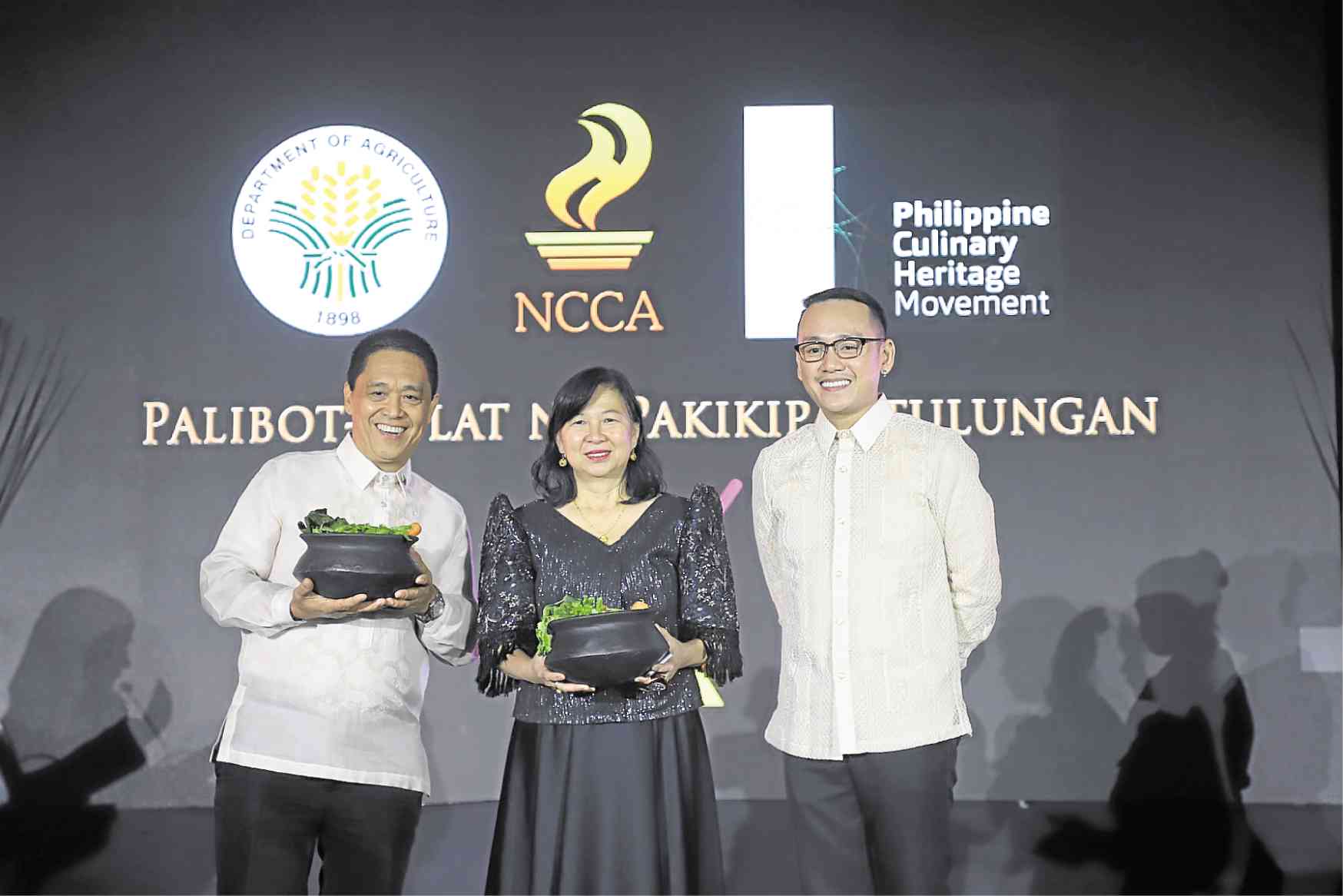
PARTNERS. NCCA Executive Director Rico Pableo Jr., Agriculture Undersecretary Evelyn Lavinia and Philippine Culinary Heritage Movement founder Jam Melchor
The Philippine Culinary Heritage Movement recently hosted the gala for the first ever celebration of Filipino Food Month in April.
Filipino Food Month is a milestone in the movement to promote and preserve Filipino food.
Many have advocated the need to preserve our culinary heritage, from the time of culinary icon Doreen Fernandez to today’s movers and shakers in the Pinoy food scene, but props to chef Jam Melchor, founder of the Philippine Culinary Heritage Movement, for coming up with the idea of asking for a government mandate for an official Filipino Food Month.
Culinary heritage
Melchor worked with the Department of Agriculture (DA) under the Aquino administration from 2012-2014 as its official “ambassador of Philippine food” for an Asean road show. He was flown to various countries to cook Filipino food using produce promoted by the DA.
This experience made him desire to further promote Filipino food not only abroad but also at home.
In 2014, he tapped prominent players in the food industry such as Nina Daza Puyat and in 2015, the Philippine Culinary Heritage Movement was formalized.
Melchor went through highs and lows soliciting support from government agencies. The National Commission for Culture and the Arts (NCCA) was cooperative and it was under former Chair Felipe de Leon that a draft for presidential decree was created.
Things went awry when de Leon stepped down. Melchor learned the NCCA could no longer get on board allegedly because food or the culinary arts was not included in the official list of seven arts under its mandate. They also said there was no special commission to accommodate concerns relating to Filipino gastronomy.
Frustrated, Melchor launched an online petition on change.org but that did not lead to much either.
Since he had worked with the DA, he solicited their help in getting a presidential decree passed. “It took us time to make them understand the significance of this movement because the focus of the DA when it comes to food is food security. We had to explain that we also have to go back to the goal of preserving food culture,” Melchor shared.
Thankfully, Agriculture Undersecretary Evelyn Laviña and Joycel Panlilio of the DA—High Value Crops and Rural Credit office listened. They then shared the draft decree with Agriculture Secretary Manny Piñol, who brought it to Malacañang.
On April 13, 2018, President Duterte signed Presidential Decree 469. April officially became Filipino Food Month in the Philippines.
What is the significance of PD 469? First, it officially recognizes culinary traditions as part of our national cultural heritage.
Second, it acknowledges that our culinary traditions should be appreciated and promoted. And more importantly, that these should be preserved “to ensure their transmission to future generations.”
Third, culinary traditions are recognized not only for cultural heritage but also for their value in supporting the various industries, farmers and communities.
With these in mind, the promotion of Filipino food and Filipino culinary traditions is now mandated by law and must be celebrated annually in April.
Besides the Department of Tourism, promotion must come from the NCCA, the DA, plus all departments, bureaus and agencies of the national government including GOCCs (government-owned or -controlled corporations). The President included all local government units and state universities and colleges to join in on the fun of promoting Filipino food.
Gastro diplomacy
Last April was the first time the decree was brought to life and it was so cool to see various government departments chiming in to celebrate Filipino food.
The DA held the La Tienda event at the CCP, highlighting our produce for trade and as part of culture.
The NCCA had an online campaign making readers aware of culinary food etymologies and promoting Filipino food literature.
The Baguio Tourism Promotions Board held Mangan Taku 2019, a Cordillera Food Fair showcasing dishes from six provinces: Abra, Apayao, Benguet, Ifugao, Kalinga, Mountain Province.
For the private sector, the likes of historian and cultural advocate Felice Sta. Maria shared with her followers about a unique Filipino food product or produce each day. Various chefs and hotels also held events celebrating Filipino food.
I was most amazed at how even the Department of Foreign Affairs under certified foodie Secretary Teodoro “Teddyboy” Locsin Jr. joined the campaign by creating “gastro-diplomacy,” with embassies launching Filipino Food Finder on social media (search #FilipinoFoodFinder or #FilipinoFoodMonth on Instagram) where Filipino restaurants around the world can be located.
This is really a significant decree that the President signed. Whether or not there is a Madrid Fusion or World Street Food Congress or Karinderya or whatever event, every April, government agencies are required and the private sector is encouraged to celebrate Filipino food.
Congratulations to chef Jam and the Philippine Culinary Heritage Movement, Sec. Manny Piñol and the DA, former NCCA Chair Felipe de Leon and the NCCA, and to all those who made this happen. And many thanks to the President for signing the decree.
It was epic.